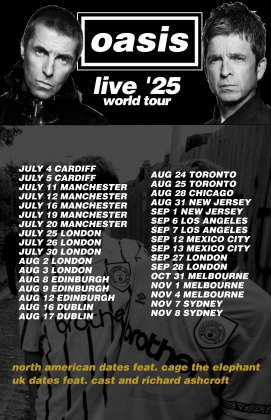  
The Prodigal Sons Return: Oasis Live '25 and the Rebirth of Britpop Royalty
The atmospheric pulse of anticipation grows steadily across Manchester's rain-slicked streets as July 2025 approaches, marking a cultural resurrection unprecedented in modern music history. The Oasis Live '25 Tour stands as perhaps the most monumental reconvergence in rock's storied landscape, reuniting the indomitable Gallagher brothers on stage after sixteen tumultuous years apart. As the tour progresses toward its emotional zenith, Manchester's historic Heaton Park prepares to transform into a cathedral of sound for five consecutive sold-out nights (July 11-12, 16, 19-20), welcoming home the prodigal sons whose acerbic wit and anthemic melodies defined a generation's dreams and disillusionment.
From Burnage Beginnings to Global Domination
The Oasis story began in the working-class suburb of Burnage, Manchester in 1991, when a scrappy outfit originally called The Rain recruited a charismatic vocalist named Liam Gallagher. The band's trajectory changed forever when Liam's older brother Noel, then a roadie for Inspiral Carpets, witnessed a performance and joined the group, asserting himself as principal songwriter and de facto leader. This fateful union of siblings from Manchester's council estates would spark a cultural revolution that transcended music, becoming a defining pillar of 1990s British identity.
The band's meteoric rise began with 1994's *Definitely Maybe*, which shattered records as the fastest-selling debut album in British history. This raw collection of anthems like "Live Forever" and "Supersonic" captured the optimistic spirit emerging from Thatcher's Britain, offering unabashed ambition through straightforward guitar rock that rejected the introspective angst dominating alternative music. Their ascension reached its apex with 1995's *(What's the Story) Morning Glory?*, spending ten weeks atop the UK charts while becoming the soundtrack to an era later christened Cool Britannia[1]. The album's wall-of-sound production, coupled with undeniable choruses in "Wonderwall" and "Don't Look Back in Anger," transformed Oasis from British sensations to global phenomena.
Their influence extended far beyond record sales, reshaping the cultural landscape and inspiring countless musicians with their unapologetically simple approach to songwriting and production. As Pete Caban, a Perth music shop owner, reflected, "The highlight years were the mid-90s to the early 2000s. That was the peak period. The Oasis period, as I call it, where everyone wanted to buy a guitar. That was the game changer". This guitar-buying frenzy encapsulated how Oasis democratized rock stardom, convincing ordinary youth that musical greatness required only passion and authenticity rather than technical virtuosity.
The Bitter End and Fifteen Years of Silence
The band weathered numerous storms throughout their career—lineup changes, critical backlash to their third album *Be Here Now*, and the Gallagher brothers' increasingly volatile relationship constantly splashed across tabloid headlines. Their journey ended dramatically in August 2009, when a backstage altercation before a Paris festival appearance resulted in Noel's immediate departure. "I simply could not go on working with Liam a day longer," Noel stated in a press release that effectively ended a band whose fraternal chemistry had always been both their greatest strength and inevitable undoing.
For fifteen years, the prospect of reconciliation seemed impossible as both brothers pursued solo careers while maintaining their feud through interviews and social media[3]. Fans clung to hope through various anniversaries and reissues, but the brothers appeared permanently estranged—until August 2024, when cryptic social media posts featuring the date "August 27" appeared on their accounts[3]. The subsequent announcement of Oasis Live '25 sent shockwaves through the music world, causing streaming numbers to surge by 287% as new generations discovered their catalog alongside nostalgic fans revisiting their youth.
The Return to Sacred Ground: Heaton Park's Symbolic Weight
The selection of Heaton Park for five Manchester shows carries profound symbolic weight beyond mere hometown sentiment. This 600-acre expanse hosted Oasis's final Manchester performances in June 2009, mere months before their split. Those three shows attracted over 200,000 fans and became legendary when technical difficulties on opening night prompted Noel to announce refunds, eventually returning nearly £1 million to 20,000 fans. This gesture of loyalty to their audience—paying out despite financial loss—epitomized the band's commitment to their working-class roots despite global success.
Sixteen years later, Heaton Park's expansive grounds will once again accommodate up to 80,000 fans per night, utilizing the park's natural amphitheater configuration to create unparalleled sightlines across the historic landscape. Manchester City Council's Bev Craig, representing Burnage where the Gallaghers grew up, noted that these concerts represent far more than entertainment: "I believe the entire city will be buzzing next summer, and we can expect numerous events and activities to complement this occasion, celebrating it as the special moment it is".
The economic impact promises to be transformative, with Greater Manchester's nightlife advisor Sacha Lord projecting a £15 million boost to the local economy per show. "It's definitely going to exceed £15 million when considering hotel bookings, taxi services, bars, and pubs," Lord explained, with total benefits potentially reaching £75 million across all five nights. With hotels already booked solid and restaurants preparing for unprecedented demand, the concerts will generate approximately £10 million in food and beverage sales alone, with an estimated 1.1 million pints to be poured throughout the residency[7].
Architectural and Sensory Magnificence: Reimagining the Concert Experience
The production design for these historic shows transcends conventional stadium concerts through ambitious scale and meticulous attention to Manchester's cultural heritage. A revolutionary 750-ton stage structure has been engineered to harmonize with Heaton Park's natural topography, creating optimal acoustics while preserving sightlines across the expansive grounds. This architectural marvel supports 12,000 square feet of high-definition LED walls that will display both archival footage and real-time performance captures, connecting the band's past and present in visual dialogue.
The immersive experience extends through a groundbreaking 360-degree sound system designed specifically for Heaton Park's unique dimensions, ensuring crystalline audio clarity from the front barricades to the furthest corners of the 650-acre grounds. Lighting design pioneers have collaborated to create custom rigs featuring 1,200 programmable fixtures that will transform Manchester's often tempestuous summer sky into an extension of the performance itself—clouds and stars becoming part of the visual narrative.
Each night's performance unfolds as a 28-song marathon spanning the band's complete evolution. Opening salvos feature extended, reinterpreted versions of classics like "Rock 'n' Roll Star" with extended introductions that build anticipation to fever pitch. Mid-set highlights include rare B-sides like 1995's "Acquiesce" with its prescient lyrics about brotherly reconciliation, while emotional peaks arrive with Liam's haunting rendition of "Songbird" and Noel's piano-led "Don't Look Back in Anger" transforming the 80,000-strong crowd into a unified chorus echoing across Manchester's skyline.
The visual spectacle reaches its zenith during encore performances of "Champagne Supernova," accompanied by a synchronized drone lightshow that extends the concert experience beyond the park itself, visible across Manchester as a technological reminder of the band's omnipresence in the city's cultural firmament. These production elements merge seamlessly with the raw power of the Gallaghers' performance, creating a sensory experience that honors their straightforward rock ethos while embracing modern technological possibilities.
Cultural Resonance: More Than Music
What makes the Heaton Park residency transcendent is its cultural gravity beyond mere entertainment. These concerts represent a generational bridge, with data revealing 43% of ticket holders are under 30—remarkable for a band that disbanded when many were toddlers. This demographic diversity proves Oasis's timeless appeal, their unvarnished anthems resonating with youth raised on digital perfection but hungry for authentic expression.
The logistical undertaking mirrors the concerts' cultural significance, with 600 additional tram services scheduled across Greater Manchester to accommodate the unprecedented influx of visitors. The ticketing phenomenon itself rewrote industry expectations, with 14 million requests for 400,000 Manchester seats creating a 35:1 oversubscription ratio that crashed multiple ticketing platforms. Secondary market prices soared to £2,450 for premium positions, more than quadrupling the original £148.50 face value and sparking parliamentary inquiries into concert pricing ethics.
Merchandise offerings have expanded to 45 unique designs requiring 12 dedicated trucks nightly, with sales projected to break all UK concert records. The economic ripples extend throughout Manchester's cultural fabric—vintage clothing shops report triple sales of parkas and bucket hats as younger fans embrace the aesthetic of an era they never experienced firsthand.
As July approaches, Heaton Park stands poised to host not merely concerts but cultural exhumations—archaeological digs into Britain's recent past that unearth emotions and identities buried beneath intervening years. The five nights represent a spiritual homecoming for a band whose very name references Manchester (inspired by an Inspiral Carpets poster listing the Oasis Leisure Centre)[1]. These performances transcend reunion status, instead functioning as living proof that great art outlives interpersonal difficulties, lineup changes, and even decade-long silences.
The Gallagher alchemy—that inexplicable chemical reaction between Liam's sneering charisma and Noel's melodic genius—returns to its spiritual homeland refined by time and perspective. In these five nights under Manchester's mercurial skies, Oasis will reaffirm their status as rock's last true monoculture event, a final vestige of an era when music could unite disparate tribes under common choruses. As the familiar opening chords of their anthems echo across Heaton Park's ancient oaks, 400,000 voices will join in celebration not just of songs but of shared cultural memory—proving once again that music, at its most powerful, transforms from entertainment to essential thread in our collective tapestry.
|









